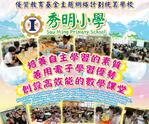Quality Education Fund Thematic Networks - Schools (QTN-S)
This programme is the continuation of the Professional Development Schools Scheme financed by the Education Development Fund. Schools with exemplary practices in learning and teaching and a good sharing culture will form a network with participating schools, focusing mainly on specific pedagogical themes to promote inter-school collaboration and professional exchange through various exchange activities. Constructing Independent and Interactive Mathematics Lessons with Various Learning Strategies (2022/23)
- Co-ordinator : Pui Kiu Primary School

To examine and share with the participating schools on how to make use of diversified strategies and effective Mathematics lessons to enhance students’ motivation in learning Mathematics and their self-directed learning (SDL) ability; To establish a collaborative and learning culture that promotes professional exchanges among teachers within and across schools.
Nurturing Students with the Quality of Self-directed Learning, Fully Utilising the Edge of e-Learning and Constructing Highly Effective Mathematics Lessons (2022/23)
- Co-ordinator : Sau Ming Primary School

To equip teachers with diversified learning and teaching strategies so as to arouse students’ learning motivation and promote learning effectiveness; To lead teachers to design key questions with a view to enhance students’ learning ability and thinking skills; To promote the development of school-based Mathematics curriculum and strengthen its vertical and lateral coherence; To facilitate teachers’ use of e-learning platforms and diversified assessment to review students’ learning outcomes and provide students with instant feedback that can improve the learning and teaching effectiveness.
The Planning and Implementation of School-based Values Education (2022/23)
- Co-ordinator : Fung Kai No.1 Primary School

To assist participating schools in developing their school-based Basic Law education lessons and learning activities as well as sharing relevant resources with them; To foster a collaborative culture within a participating school through activities such as collaborative lesson planning, lesson observations cum post-lesson discussions; To share the successful experience of the network coordinating school and participating schools with teachers in Hong Kong.
Catering for Learner Diversity and Special Educational Needs through the Use of Diversified Learning and Teaching Strategies or Whole-person Development Approach to Guidance and Discipline (2022/23)
- Co-ordinator : Hong Chi Winifred Mary Cheung Morninghope School

The project aims to enhance teachers’ professional capacity in catering for learner diversity and special educational needs through whole-school curriculum planning.
Quality Education Fund Thematic Network – Schools (QTN–S) Dissemination Seminar (2021/22)

In 2021/22 school year, QEF sponsored 16 secondary schools and primary schools to implement QTN-S, which covered different subjects and themes. The QTN-S has provided support to the participating primary and secondary schools and enhanced professional exchanges as well as professional capacity building to facilitate the continuous development of schools.8 QTN-S dissemination seminars would be organized in the form of online live webinars from 6 July to 10 August 2022.





